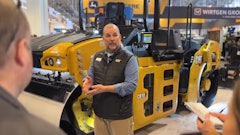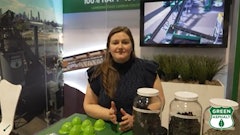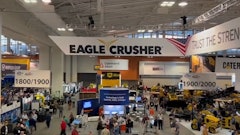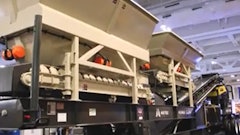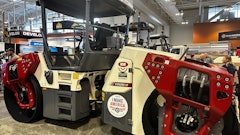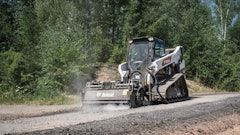
Five years ago it seemed that Morsky Construction Limited (MCL) had said its final farewell to the asphalt paving business. It was 1989 when the Saskatchewan-based earth and base contractor first entered into asphalt paving construction with a completely new spread of equipment - asphalt plant, pavers and rollers. But as declining job prices, higher risk of potential penalties and fewer tendered quantities contributed to lower profit margins, Brian Morsky and his team decided to get out of the paving game after 16 years.
"We decided to get away from typical highway paving and focus on specialty jobs and other more innovative work like micro surfacing and remixing additives," said Allan Barilla, general manager of MCL. "Given the economic conditions, we thought we could run smaller, highly specialized crews and generally just try to put less stress on ourselves and hopefully increase our profit margin."
It wasn't a complete change of direction for MCL. The family-owned company had previously purchased two Wirtgen W2500S remixers to add road recycling and stabilizing services to its repertoire and would continue to perform that work. Much of MCL's specialty expertise had been initiated while it was still a strong paving player as well.
MCL couldn't be blamed for making a change when they did. In fact, two of the company's local competitors re-focused their paving operations as well. But a funny thing happened in the five years since the transition - the Saskatchewan paving market turned around. The government placed more asphalt work on the market and contractors were getting better prices for paving work. On top of it all, companies running asphalt plants were too busy to supply asphalt to anyone other than their own crews.
The outlook for MCL changed as the company prepared to tackle a 16-mile-long project on Provincial Highway 35 near Tisdale, Saskatchewan. The contract called for the existing asphalt surface to be recycled to a depth of six inches while fresh gravel was mixed in to create a new base. The problem was it appeared unlikely that MCL would be able to find an available subcontractor to produce and lay the 67,000 tons of asphalt required for the new road surface after the preparatory work was done.
"Between supplementing our own work and opportunities for our specialty work decreasing, we realized we had to get back into the asphalt paving business," said Barilla. During its previous paving stint, MCL operated a Cedarapids 8835 asphalt plant with a wet wash system. MCL was always pleased with the plant's performance - but its 275 tons per hour (TPH) size and the wet wash inconvenience were issues.
"It was a medium sized plant," said Barilla. "It often wasn't worth the teardown and setup time to go after 10,000- to 15,000-ton projects. Companies with smaller plants could whip in and do the job more efficiently. And on large jobs, the bigger guys had 300 to 425 TPH plants and could get things done more quickly. We were kind of stuck in the middle."
MCL went through an exhaustive research process to find a new asphalt plant that could better suit its operation. The company assembled a list of particular specifications it was looking for, most important that the plant be extremely portable and capable of producing 225 TPH. But MCL found that most manufacturers were unable or unwilling to build a plant that could match the required specifications.
"They couldn't make the plant we were asking for," said Barilla. "Most of them wanted to sell us on something bigger that would give us larger capacity capabilities in the future. But that would mean everything would be bigger, and we wanted to make it more portable."
Eventually the search led to an asphalt plant manufacturer that MCL hadn't seriously considered at first, Asphalt Drum Mixers, Inc. (ADM). "We weren't familiar with their larger plants, only their smaller 110 TPH units," said Barilla. "But we toured a larger ADM plant and saw firsthand that it was heavy-duty and really well put together from a construction standpoint. The contractor also advised us that ADM was very committed to servicing the plant owner after the sale. Ultimately, they were the only ones that truly understood our requirements and could meet our specifications without any sacrifices."
MCL opted to purchase an ADM Milemaker plant, knowing it would provide a high level of production while remaining portable enough to be easily moved when needed. In July 2010, an ADM service representative arrived at the Highway 35 jobsite to assist with plant assembly. "It was great to have ADM there at the start to help us get up and running," said Barilla. "We have some veteran crew members who understand the basics of plant setup, but there were some aspects we weren't familiar with from our previous plant."
The biggest difference with the new Milemaker plant is that it features a counterflow technology system that utilizes two drums instead of one in order to maintain separate zones for drying and mixing. This setup maximizes heat transfer and fuel efficiency to virtually eliminate unsafe hydrocarbon emissions. The design then goes one step further to control emissions by reintroducing any residual gases back into the drum's combustion zone.
This counterflow system fit the mold of what Morsky was looking for, as the company had identified early on that the environmental impact of a plant would be a critical factor in its purchase decision. According to Barilla, the new plant could enable them to locate the plant within city limits if required to compete for a job. The company is also proactively moving themselves ahead of the curve in anticipation that the government will soon pass new regulations requiring more environmentally friendly plants.
"We wanted a plant that is so efficient, so environmentally friendly, that nobody could tell if it's running unless they're standing next to it and can hear it," said Barilla. "That's what we have now."
MCL has been extremely pleased with the overall performance of the Milemaker through its first couple months of operation. "There are a lot of plants out there that require constant adjustments to deliver the desired asphalt mix," said Barilla. "With the Milemaker, once we make our calibrations, all we do is enter the numbers on the computer to achieve the desired mix, and it's right on every time. The plant has been so reliable and consistent - it's surpassed our expectations."
Barilla noted that the experienced inspectors responsible for testing the mix quality on the Highway 35 project have made comments asking what the point is of them even being there. "Every single test has been coming up exactly what it's supposed to be," said Barilla. "I'm fully expecting that we'll be earning bonuses on our test results for segregation and ride."
The productivity of the Milemaker plant seems to fit right in with MCL's company philosophy of aspiring to do high quality work with first class equipment. "We take a lot of pride in having our work stand the test of time, and we feel having the latest technology is an important factor in accomplishing that," said Barilla. "Some people in our position may have settled for less when just getting back into the asphalt business, but we've held ourselves to a higher equipment standard over the years. We try to do things the right way, even if that means searching far and wide to track down the best equipment out there for our operation. That's what we've found again with our ADM plant. ADM's sales and service support have been exceptional, and it's made for a fantastic working relationship."
Looking at the big picture after the Highway 35 project, MCL expects that its workload will dictate producing 125,000 to 150,000 tons of asphalt annually, with 95-percent of the production going to its own paving crews. Barilla anticipates the Milemaker will likely be moved about three to four times a year as MCL travels to various jobsites across the expansive province of Saskatchewan. And now that the company's paving operation is back up and running with a highly portable plant, staying productive and competitive will be as easy as packing up and hitting the road.












